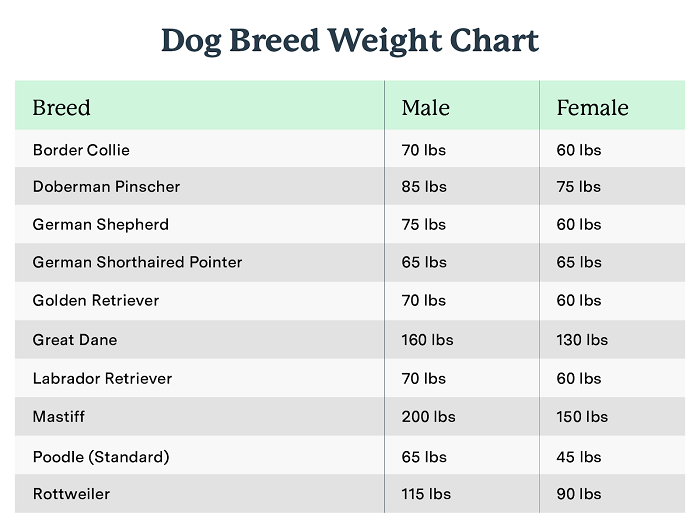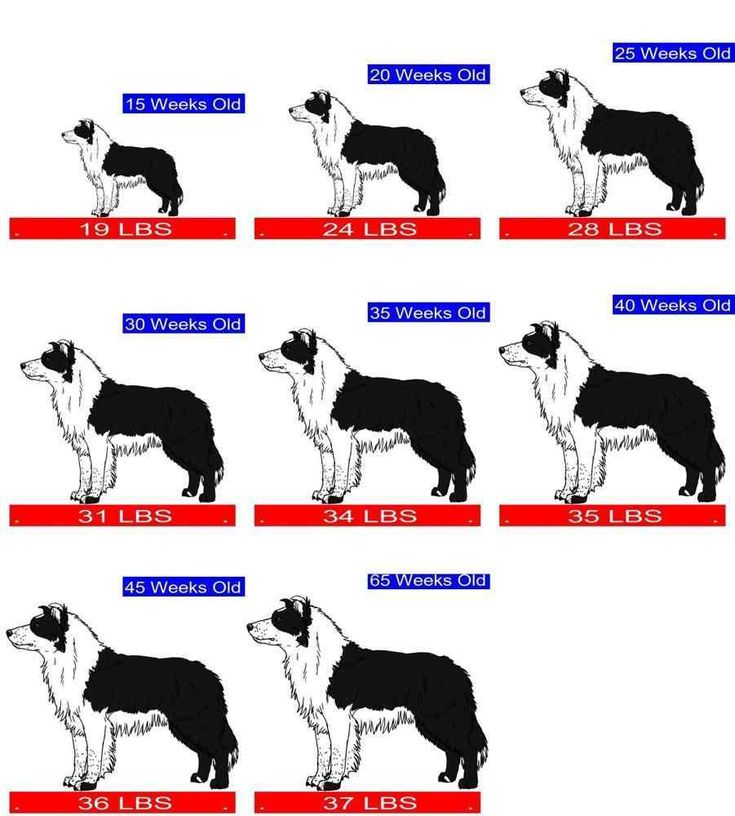Border Collies are not just pets; they are loyal companions that fill our lives with joy. To ensure they enjoy a happy and healthy life, it’s vital to monitor their weight closely. But how much should your Collie weigh?
In accordance with the official statistics of Border Collie Breeding, fully grown female Border Collies generally fall within the weight range of 30 to 45 lbs. On the other hand, male counterparts typically weigh between 40 and 55 pounds.
In this comprehensive guide, I will deliver you Border Collie weight management, how to calculate the ideal range, and why maintaining a healthy weight is crucial. So let’s go!
What Age Are Border Collies Full Grown?

The age at which they are considered fully grown can vary from one individual to another, but on average, Border Collies reach full physical maturity between 12 to 15 months of age. This means that by this point, they have attained their adult size, weight, and body structure.
It’s important to remember that the growth rate and timing can differ based on factors such as genetics, nutrition, and overall health. Some Border Collies may reach full maturity closer to the 12-month mark, while others might take a little longer, up to 15 months. During this phase, you can expect your Border Collie to fill out and develop the muscular frame that is characteristic of this breed.
When Do Border Collies Stop Growing?
Border Collies typically stop growing in terms of their physical size and weight by the time they reach 12 to 15 months of age. At this point, they have reached their full adult height and have developed the muscular frame characteristic of this breed. However, it’s important to note that their mental and behavioral development is an ongoing process that continues throughout their lives.
The exact timing of when Border Collies stop growing can vary from one individual to another. Factors such as genetics, nutrition, and overall health can influence the growth rate and the age at which they reach full physical maturity. Some Border Collies may reach their adult size closer to 12 months, while others might take a bit longer, up to 15 months.
What Is the Size and Weight of a Collie?

The size and weight of a Border Collie can vary slightly based on gender, genetics, and individual factors. On average, a male Border Collie stands between 19 to 22 inches (48 to 56 cm) tall at the shoulder, while females are slightly smaller, ranging from 18 to 21 inches (46 to 53 cm) in height.
In terms of weight, male Border Collies typically weigh between 30 to 45 pounds (14 to 20 kg), while females usually weigh around 27 to 42 pounds (12 to 19 kg). However, these are general guidelines, and individual dogs may fall outside of these ranges while still being perfectly healthy.
What If My Border Collie Is Not the Right Weight?
Maintaining a healthy weight for your Border Collie is essential to their overall well-being. If you believe that your Collie is over or underweight, it’s important to address the issue promptly. Here are some signs that your Border Collie may not be at the right weight:
Underweight Border Collie
- Visible ribs, spine, or hip bones.
- Lack of muscle tone.
- Reduced energy levels.
- Dull coat and dry skin.
Overweight Border Collie
- An inability to feel the ribs or spine due to excess fat.
- Low stamina and reluctance to exercise.
- Labored breathing.
- Joint problems.
How Do I Calculate My Border Collie’s Weight?
Calculating your Border Collie’s weight can help you determine if they are within a healthy range. The most common method for assessing a dog’s weight is by using the Body Condition Score (BCS) system. This system evaluates your dog’s body on a scale from 1 to 9, with 1 being underweight and 9 being obese. A healthy Collie should ideally score between 4 and 5 on this scale.
To calculate your Border Collie’s weight, follow these steps:
- Feel the Ribs
Run your hands along your dog’s sides. You should be able to feel the ribs without pressing too hard. If the ribs are visible with no fat covering, your dog may be underweight.
- Examine the Waist
Look at your dog from above. There should be a noticeable waistline behind the rib cage. If there is little to no waistline, your dog may be overweight.
- Observe the Belly:
View your dog from the side. The abdomen should appear tucked up towards the hind legs. If it sags downward, your dog may be overweight.
- Consult Your Veterinarian
If you’re unsure about your Collie’s weight or concerned about their health, consult your veterinarian. They can provide a professional assessment and offer guidance on achieving or maintaining a healthy weight.
How Much Should Your Collie Weigh?

The ideal weight for your Border Collie can vary based on their age, gender, and activity level. As a general guideline, adult male Border Collies should aim to maintain a weight between 30 to 45 pounds (14 to 20 kg), while adult females should aim for a weight of approximately 27 to 42 pounds (12 to 19 kg).
However, it’s important to remember that these are just averages, and individual dogs may have different needs. Some Collies may naturally fall outside of these weight ranges while still being healthy. To determine the ideal weight for your specific dog, it’s best to consult with your veterinarian, who can provide personalized recommendations based on your Collie’s unique characteristics and lifestyle.
Factors That Affect Border Collie Growth
Several factors can influence the growth and weight of Border Collies. Understanding these factors can help you better manage your dog’s health and ensure they remain at an ideal weight throughout their life.
- Nutrition
Proper nutrition is vital for healthy growth and weight maintenance in Border Collies. Providing your dog with a balanced diet that meets their specific needs is essential. Consult your veterinarian for guidance on choosing the right food and portion sizes for your Collie’s age, size, and activity level.
- Health
Your Collie’s overall health plays a significant role in their weight and growth. Regular veterinary check-ups can help identify any health issues that may be affecting their weight. Conditions such as thyroid problems or digestive disorders can impact a dog’s weight and require medical attention.
- Physical Exercise
Border Collies are known for their high energy levels and need for regular exercise. Sufficient physical activity is crucial for maintaining a healthy weight and overall well-being. Ensure your Collie gets plenty of daily exercise through activities like walking, running, fetch, and agility training.
- Genetics
Genetics can also influence a Border Collie’s growth and weight. Some Collies may naturally have a higher or lower weight range based on their genetic makeup. While genetics play a role, proper diet and exercise are essential in managing your dog’s weight effectively.
Final Words
How much should your Collie weigh? Keeping your Border Collie at an ideal weight is essential for their overall health and happiness. Regular monitoring of their weight, balanced nutrition, and ample exercise are key factors in achieving and maintaining a healthy weight.
Remember that individual dogs may have unique needs. So consulting with your veterinarian for personalized guidance is always a wise choice. By providing the right care and attention, you can ensure that your Collie enjoys a long and active life filled with joy and vitality.
You may also read
